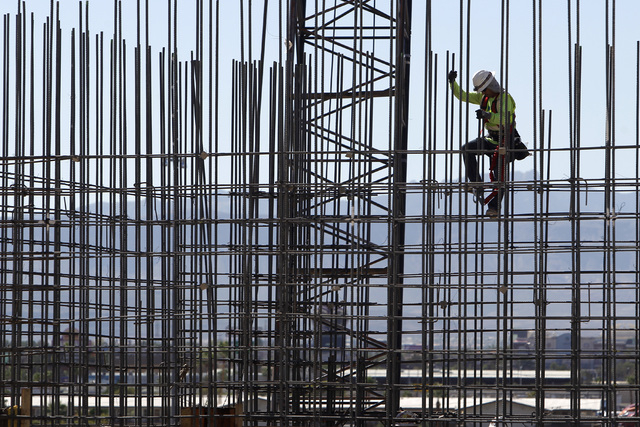Nevada looks to change economic incentives
CARSON CITY — Four years ago, the focus of Nevada economic development was creating jobs. With tens of thousands of people out of work, almost any job was welcome as the state tried to claw its way out of the Great Recession.
But with the economy rebounding, officials are looking beyond just job creation to laying the groundwork for a whole new economy based on high tech — from drones and advanced manufacturing to health care and renewable energy.
That shift could bring a change in priorities for tax abatements.
A bill being proposed by the Governor’s Office of Economic Development would reduce the amount of abatements available to companies that pay below the state’s average wage, depending on the county location and unemployment rate.
The current statewide average pay is $20.62 an hour. That’s up from $19.83 in 2010 and $15.07 at the turn of the century in 2000.
“Below some thresholds, companies would not be eligible at all,” said Steve Hill, executive director of the economic development agency.
It’s a shift from when Republican Gov. Brian Sandoval first took office in 2011. The state’s double-digit unemployment rate was the highest in the nation as the Great Recession gutted Nevada’s tourism-based economy and the housing market collapsed, putting tens of thousands in the construction trades out of work.
The main thrust then was to get people working as quickly as possible.
“Our purpose will shift somewhat to jobs paying higher than the state average wage,” Hill said. “We’ll reduce abatements for companies that have jobs below the state average wage when the unemployment rate is below 6 percent.”
Nevada’s jobless rate is around 6.9 percent, about half of what it was in late 2010.
Senate Bill 74 was pre-filed in the Legislature and will be considered during the session that begins Feb. 2.
In fiscal year 2010, 17 companies were granted abatements totaling $9.4 million, including $5.8 million in forgiven sales and use taxes. They pledged $103 million in capital investment in the state.
A year later, $19.5 million in abatements over 10 years was approved for 16 companies. The agency calculates the incentives led to $48.7 million in new tax revenue and will have a $2 billion impact on the economy during that time.
In 2012, $74 million in abatements were approved for 19 companies that pledged about $600 million in capital investment, generating a $2.3 billion boost to the overall economy over 10 years.
Those years pale in comparison to the $1.3 billion in incentives awarded in September to Tesla Motors to build a $5 billion battery factory in Northern Nevada. That project is expected to employ more than 6,000 and bring a projected economic impact of $100 billion over 20 years, state officials have said.
About 450 construction workers are currently on the Tesla site, 20 miles east of downtown Reno in the Tahoe-Reno Industrial Center. Hill said 80 percent of the workers are Nevadans, with half from the Las Vegas area.
“The project is proceeding exceptionally well,” said Hill, who recently visited the site. “The progress they are making is tremendous.”
Tesla, led by billionaire Elon Musk, has said making cheaper lithium-ion batteries able to retain a charge for greater distances is key to mass-marketing Tesla’s next generation of electric cars.
Hill last week assured members of the state economic development board that Sandoval’s proposed business license fee to raise an estimated $440 million over two years will not deflate Nevada’s ongoing efforts to diversify the economy.
“The business license fee that is being proposed is tailored in a way that works exceptionally well for economic development,” Hill said, adding that a company’s out-of-state sales will not be included in calculations.
Administration officials have said the tiered fee schedule proposed would range from $400 annually to about $4 million, based on a company’s gross receipts. Details on how the fee would be applied have not yet been released.
Another measure backed by economic development officials is Senate Bill 93, which would make partial tax abatements available to the aviation industry, including businesses that operate, manufacture, test, repair and assemble an aircraft or components.
To qualify for up to 20 years in abatements, companies would have to pay at least the statewide average wage and make a new capital investment in the state of $250,000 or maintain at least $5 million in tangible personal property.
Besides abatements, the Governor’s Office of Economic Development also is backing measures to bring medical specialists to the state and entice growth in the aviation industry.
Senate Bill 68 would allow physicians in specialized fields to obtain Nevada licenses through “endorsement” if they are in good standing and licensed in another state, the District of Columbia or a U.S. territory. The measure also would require the State Board of Medical Examiners to issue qualified out-of-state medical school graduates limited licenses to enroll in Nevada graduate residency programs.
Health care was identified as a targeted growth sector in the state’s economic development strategic plan.
Contact Sandra Chereb at schereb@reviewjournal.com or 775-687-3901. Follow @SandraChereb on Twitter.

















